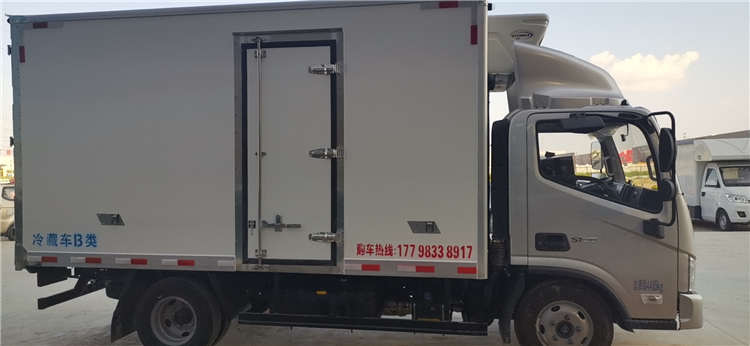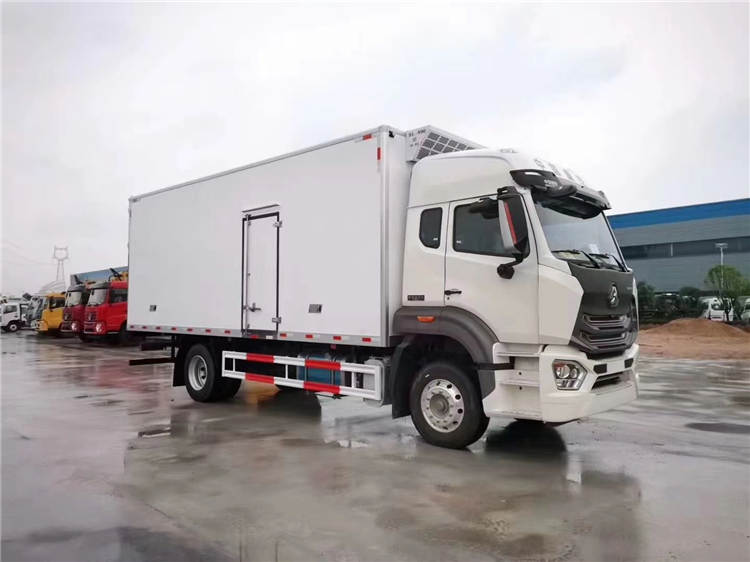How to choose a refrigerated truck The output of my country's agricultural products is huge, whether it is grain, meat, eggs, or aquatic products, fruits, vegetables, etc., the output is showing a rapid growth trend. Therefore, ensuring food quality and reducing food loss is a systematic project as well as a people's livelihood project. Nowadays, many large and medium-sized cities use refrigerated trucks for the transportation of goods. Because the industry penetration rate is still low, there are still a large number of food, meat, fruits, vegetables, medicines, alcohol, etc. that deteriorate during the transportation process every year. Unnecessary losses. The vigorous promotion and application of energy-saving and environmentally-friendly refrigerated trucks is of great significance for further integrating the refrigerated truck market, improving the status quo of my country's refrigerated transportation industry, reducing the waste of perishable goods in transit, and ensuring food safety, and should be paid attention to by all sectors of society. 1. Structural features and options of refrigerated trucks A refrigerated truck is a special refrigerated transport vehicle equipped with a refrigeration device and a polyurethane insulation compartment. It is commonly used to transport frozen food (freezer truck), dairy products (dairy truck), vegetables and fruits (fresh goods truck), vaccine drugs (vaccine transportation) Car) and so on. The refrigerated truck consists of the walking part of the special car chassis, the body part (composed of glass fiber reinforced plastic, color steel plate, aluminum alloy, stainless steel and other materials), the heat insulation layer part (usually polyurethane), the refrigeration unit part, and the temperature recorder. For vehicles with special requirements, such as meat hook trucks, meat hooks, aluminum alloy guide rails, ventilation slots and other ancillary equipment can be installed. The manufacturing technology of refrigerated car body. At present, most of the large domestic refrigerated car manufacturers adopt the "sandwich" board bonding technology of piece-by-piece assembly, and the inner and outer skins are made of composite materials, such as glass steel plate, color steel plate, aluminum alloy and other materials. The material of the inner plate should be different for different goods. The more expensive inner plate should be stainless steel. The middle interlayer is made of thermal insulation material, mainly using polyurethane foam material. The four sides use high-strength glue to glue the glass steel plate and the polyurethane foam material together to form a closed plate; there are also split-assembled injection foaming and integral skeleton injection foaming. Different goods have different requirements for the box body. For example, refrigerated trucks for transporting fresh meat need to have custom hooks on the body; refrigerated trucks for distribution to stores require multi-temperature refrigerated trucks due to the small batch of goods and the variety of goods; for goods with varying temperature requirements and frequent loading and unloading, You need to open more refrigerated trucks. The power source from the refrigeration unit can be divided into independent and non-independent units. The independent unit has a separate power source. The difference is that the independent unit is completely powered by another unit to maintain work; the non-independent unit is completely driven by the engine working power of the entire vehicle to drive the cooling work of the motor unit. Refrigerator truck refrigeration units are generally installed on the top of the front of the container, which has an air-conditioning-like appearance, but has a stronger cooling capacity than an air conditioner of the same volume. General models use external coolers, and a few miniature refrigerated vehicles use built-in coolers. For refrigerated trucks with lower temperature requirements, a built-in cold plate can be used. Generally, refrigeration units with different power and cooling capacity are selected according to the volume of the refrigerated compartment and the temperature requirements of the goods being transported. Two, the use of refrigerated trucks Refrigerator trucks are specially used for the transportation and storage of temperature-sensitive products. Temperature protection is the key to refrigerated trucks. If used or handled improperly, the goods will not be stored or transported in a perfect state. Now introduces how to use refrigerated trucks correctly to avoid the risks caused by improper use. Before loading, the carriage must be pre-cooled or pre-heated for about 1.5 hours. Because the vehicle is parked in the open air, usually the temperature of the compartment is the temperature of the outside environment. After the goods are loaded into the compartment, the ambient temperature in the compartment will affect the temperature of the goods being transported, which will cause the quality of the goods to be changed. Therefore, the compartment must be pre-loaded before loading. Cool to the necessary temperature. The refrigeration unit must be shut down during loading and unloading. Many people do not turn off the refrigeration unit when loading and unloading goods. This is a very wrong operation. The principle is: when the car is pre-cooled, if the car is not shut down and the car door is opened, because the fan of the refrigeration unit evaporator is working, The front of the fan is positive pressure, and the back is negative pressure, so the cold air is blown out from the upper part of the car, and the lower part will quickly suck in the hot air from outside, which will cause the temperature in the car to rise rapidly; In the stopped state, the air flow stops, and the wind pressure inside and outside the car is the same, so that the speed of the external hot air passing into the car is relatively slow. When using a refrigerated truck, the floor of the truck should be kept clean. Due to the action of the evaporator fan, air will circulate in the compartment, causing debris or dirt on the ground to be sucked in by the evaporator fan. Long-term action will cause a large amount of impurities to be sucked into the evaporator coil, thereby affecting the refrigeration effect of the refrigeration unit. Proper packaging is essential to protect the goods. If the goods are frozen, non-ventilated packing boxes should be used. Because the wind blows over the surface of the frozen goods, the moisture in the goods will be lost and the quality of the goods will decrease. my country's regulations on bulk quick-frozen foods are not allowed to be sold, and this is the reason that they must be sold in packaging; for fresh goods, packaging boxes with ventilated side walls must be used. Due to its own characteristics, fresh goods are still breathing during storage and transportation. If they are not well ventilated, the goods will deteriorate and become damaged. When loading goods, do not stack the goods too high, and make sure that the height of the goods is not higher than the plane height of the air outlet. If the front of the air outlet is blocked by the cargo or is too close to the cargo, it will not only affect the storage and transportation temperature of the cargo, but also affect the normal operation of the refrigeration unit. Because if the air outlet is blocked by the cargo, the cold air cannot circulate normally in the compartment, which will increase the local temperature of the cargo. On the other hand, some of the defrosting designs of refrigeration units use air induction defrosting, blocking the air outlet, which will greatly reduce the defrosting effect. When loading goods, double-sided pallets must be used for loading to ensure the circulation of cold air on the ground. It is strictly forbidden to stack the goods directly on the flat floor; plastic film cannot be wrapped on the fresh-keeping pallet, which will block the circulating cold air flow to the goods. Third, the correct maintenance and repair of refrigerated trucks The maintenance of refrigerated trucks is very important. Only the correct maintenance of the equipment on time can ensure the normal use of the equipment and prolong the service life of the equipment. Usually the refrigeration unit is maintained every 500h~700h, and the oil filter element, fuel filter element, and air filter element need to be replaced; and pay attention to check the tightness of the belt and whether the refrigeration system leaks. At present, some brands of refrigerating units in order to meet the needs of environmental protection, minimize damage to the environment and reduce the emission of harmful substances, so they use synthetic or semi-synthetic engine oil to replace ordinary engine oil, thereby extending the maintenance time of the engine, usually according to 2000h. One time maintenance. Therefore, the emission of waste engine oil is reduced. In addition, scientific experiments have proved that by using this high-end engine oil, not only the wear on the engine is reduced, but also the fuel consumption of the engine can be reduced. Therefore, scientific maintenance can not only ensure the integrity of the equipment, but also reduce operating costs. Generally speaking, the daily maintenance of the refrigerated car body is mainly reflected in: the inspection of the outer surface of the car, the inspection of the inner surface of the car, the inspection of the inner and outer edges of the car, the inspection of the inner floor of the car, and the internal lighting and cooling air outlets. Check etc. Do not scratch the outer surface of the refrigerated car, otherwise it will reduce the ability of FRP to withstand pressure and be more prone to aging and deformation. On the other hand, it will leak the polyurethane filled inside and affect the insulation performance of the car. The maintenance of the inner surface of the refrigerated truck should be well adjusted for temperature control. Do not freeze the inner surface of the compartment. If the air humidity is relatively high, try to pack the refrigerated products as much as possible, especially if the aquatic products are packaged and sealed to reduce the moisture inside the compartment. Evaporation reduces the possibility of icing inside the refrigerated truck. If there is a layer of ice on the inner surface of the refrigerated truck, use a deicing shovel to remove it every time the goods are transported to prevent the ice layer from becoming thicker, otherwise it will not only affect the storage space of the compartment, but also increase the weight of the vehicle. , Increase fuel consumption. Similarly, care should be taken to avoid damage to the inner surface of sharp goods or packaging boxes. The following inspections are recommended before the refrigerated truck is loaded with cargo each time: the fuel supply of the refrigerated truck must be sufficient to ensure that the engine runs to at least the next inspection point; the engine oil level of the refrigerated truck should be at the (full) mark, and do not overfuel; see the amount of coolant Is it correct? The battery connection port of the refrigerated truck must be firm and free of corrosion. The electrolyte should be at the full mark; the belt must be good and adjusted to a proper degree of tension, and the span between the pulleys should be 13mm sag; ensure that the electrical connectors in the electrical control circuit are firmly fixed; the wires and terminals should be free from corrosion or burns. Check whether the unit is leaking, whether the parts are loose or broken, and whether the installation gasket of the gasket unit is compressed; the condenser and evaporator coil of the refrigerated truck should be clean and free of dirt; ensure The defrost drainage device is unblocked. Four, concluding remarks In summary, refrigerated trucks have played an important role in satisfying people's heat preservation and refrigeration transportation of food. With the improvement of people's living standards and the emphasis on food safety, the development of the cold chain industry is optimistic, the market for the development of refrigerated trucks is huge, and it is urgent to strengthen the technical application of refrigerated trucks.
Extrusion molding, also known as extrusion molding or extrusion molding, mainly refers to a molding method in which heated and melted polymer materials are forcibly formed into continuous profiles with constant cross-section through the die under the promotion of pressure with the help of the extrusion of screw or plunger. Extrusion process mainly includes feeding, melting and plasticizing, extrusion, shaping and cooling.
Extrusion molding is an efficient, continuous, low-cost and wide-ranging molding processing method. It is an early technology in polymer material processing. After more than 100 years of development, extrusion molding is a molding processing method with the most production varieties, the most changes, high productivity, strong adaptability, wide applications and the largest proportion of output in the field of polymer processing.
Pu plastic extrusion is also known as extrusion in plastic processing. In non rubber extruder processing, it uses hydraulic press pressure to extrude the die itself. It refers to a processing method in which materials are heated and plasticized while being pushed forward by the screw through the action between the extruder barrel and the screw, and continuously pass through the machine head to make products or semi-finished products with various sections.
PU extrusion profile, PU plastic extrusion profile, PU plastic extruded profile, PU plastic custom extrusion profile Glove Industry Co.,Ltd. , https://www.gloveind.com


August 10, 2022